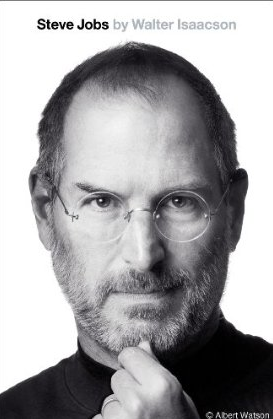
My friend Peter K is a speaker, author, health and success coach, nutritionist and physical therapist. (His website Peter K Fitness tells his story, introduces his method and explains how his approach has helped countless people lead a healthier lifestyle. Some impressive testimonials are there too!) Peter is Elana’s health coach and played a huge role in her becoming as fit as she now is. (It also turns out that I had the privilege of officiating at his wedding more than a decade ago. A connection we did not make until Elana met him for her first training session.)
Peter is an entrepreneur at heart. He recently read the Steve Jobs biography and, to use his own words, the “book really resonated” with him. He jotted down a few thoughts while reading it and shared them with me. I, in turn, asked if I could share them with all of you. And so, with no further ado I present to you “Peter K’s What Steve Jobs taught me about being successful in business”.

What Steve Jobs taught me about being successful in business
“Am I a “sh&*head” or superstar?” I found myself asking that question while reading Walter Isaacson’s biography, Steve Jobs. Having read Isaacson’s Franklin and Einstein, I expected excellence. I wasn’t disappointed. His genius in this latest work is that he never got in the way of the story. And what a story it is. You don’t have to add anything to make the life of Steve Jobs read like a runaway roller coaster, never equipped with a braking system. But this isn’t a book review, it’s a life review. So, would Jobs think I was a sh%&head or a superstar? I’d like to think the latter.
While reading the book I made some mental comparisons between Jobs being an orphan and the fact I lost my father when I was a teenager. (Truth is, my father was never really involved in my life.) I’ve been searching for a role model ever since. I found one in Jobs, especially when it comes to running a company.
Initially I found myself dismissing Jobs as a rude jerk, but soon modified my opinion, not making excuses for him, but appreciating his genius while not agreeing with his tactics. I still don’t believe that people are either sh$#heads or superstars, but Jobs’ unwillingness to compromise his visions, the way he ran Apple, and his personal life, all resonated with me. In a world where mediocrity is a commodity, Jobs would have none of it.
The book has changed my perspective on my work in more ways than I could have imagined. It has renewed my motivation to continue being an entrepreneur while staying focused on the fact that I, like Jobs’, might be crazy enough to think I can change the future, just by believing it.
I felt compelled to make notes, and soon realized I had some of the same beliefs that Jobs did. Although I make it a point to highlight people’s strengths, instead of naming assholes, I have to respect a person who had such strong convictions that he would not allow compromise just to get things done. Here’s a top ten list of what made the most sense for me as a business owner, father and human being. I use most of these principles everyday to run my wellness business in an attempt to set myself apart in a competitive field full of mediocre people, services and products, that produce profits, but distract one from achieving greatness. Jobs might define Microsoft in that way.

1. Be relentless: Never give up whether it’s making phone calls, sending emails or pushing through a vision you have if you believe in it. If you don’t do it, no one will.
2. Get rid of the superfluous: If it doesn’t make sense, doesn’t add anything to the value or function, or you just don’t need it, get rid of it.
3. Make end to end user experiences: Jobs did it with revolutionary products and apple as the “hub”. Don’t let outsiders water down your product with mediocre contributions. Be a control freak for the greater good.
4. Focus on no more than 3 things at time: Make a list of what you want to accomplish or what’s most important, then slash all but 3 of the core ideas or essentials. Don’t let yourself get distracted.
5. Create a product or service that you and your friends would want to use yourselves. Love it!
6. Care about your products and services as if they were your children.
7. Focus on simplicity and ease of use: Don’t “over do” something just to impress or make yourself look good.
8. Expect the impossible from yourself and those you work with: Demand and work with only the best people.
9. Don’t use focus groups. People don’t know what they want until you give it to them or show them what they need. Give them what they are going to want in the future by believing in your vision and making it a reality.
10. Marry science, art and the humanities to create incredible, beautiful and life-changing products and services.
